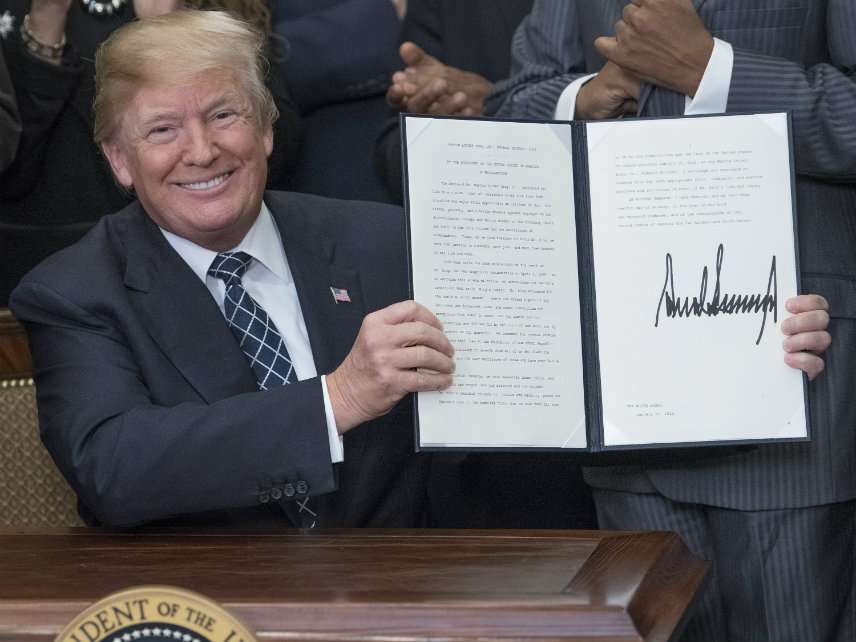For Libertarians, No Silver Lining With President Trump
There's been little sign that those who despise Trump are beginning to understand that the only real solution lies in radically shrinking the state.

I confess I was indulging in wishful thinking when I thought I detected a silver lining to Donald Trump's election as president. That's what comes of being an optimist and a libertarian romantic. Beware apparent silver linings; they may be fool's gold instead.
The ultimate hoped-for silver lining was that having a man such as Trump—need I furnish a list of unflattering descriptors at this late date?—on top of the political heap would discredit the very idea of government itself. A scaled-down version was that with Trump in charge, the bloated presidency might finally receive the long-overdue inspection it deserves. After Trump, how could anyone want to see so much power and discretion, not to mention the nuclear launch codes, in the hands of one person?
In the past, people of the opposing party and ideological grouping asked that question but with an obviously partisan agenda in mind. Democrats and progressives railed at George W. Bush's imperial presidency, but they rolled over as soon as Barack Obama assumed the helm. At that point the dramatis personae smoothly changed roles with no hint of awareness of their hypocrisy. Something similar happened when the White House passed from John F. Kennedy and Lyndon Johnson to Richard Nixon. The apparent principled protests against power were in fact no more than talking points from the out-of-power camp. In reality the worry was not the amount of power but only who exercised it. There was little appetite shown for institutional reform, presumably because each side wanted the power available the next time it held the White House.
I had naively hoped that might change into a principled disgust with power in the wake of Trump's ascension to the pinnacle of government. Unless I've missed something, I see no sign that those who properly despise Trump are beginning to understand that the only real solution lies in radically shrinking the state.
The problem is that the idea of the state is too deep in the psyche to be uprooted by a mere personality—even one as repugnant as Trump. In reality the state is a church (or, more precisely, states and churches have a common genus), complete with a dogma, rituals, and taboos that most people have no desire to question. Thus it would take more than a dangerously obnoxious president to get people to entertain fundamental questions about their faith. The easier coping mechanism is to tell oneself that the voters must work harder next time to get the right person into office.
If anything, Trump makes that mechanism seem even easier to use. He's the alleged outsider, the business tycoon without government experience who thought he could sort-of-autocratically run the state apparatus like the Trump Organization. Some but not all of Trump's shortcomings—not to put too fine a point on it can be attributed to his outsider-ness. So most people who oppose Trump can fall back on the excuse that all of Trump's problems stem from his failure to have risen through the political ranks. The lesson they will take away from the experience: next time let's elect a conventional politician who understands the art of governing first hand. That would have been harder to argue had an experienced politician with Trump's features (if such a person were possible) been elected, although some would have made the argument anyway. Let's face it: for them, any argument would be preferable to the libertarian argument against power per se.
Are there any silver linings to a Trump presidency on the policy front? Aside from some deregulation and modest tax reform (which other Republicans could have been expected to enact), I see none.
Some of Trump's campaign rhetoric might have fed a desperate hope for some challenge to the American empire, but look what's happened. No silver linings there, and that's unsurprising because Trump never had anything more to say on the matter than a few one-liners calculated to appeal to a constituency which likes believing the United States is the victim not the victimizer on the world stage. He's embraced NATO and Saudi Arabia, become belligerent toward Russia, and appointed the son of Israeli Prime Minister Benjamin Netanyahu's old friend—namely, son-in-law Jared Kushner, complete with religious and financial conflicts of interest—to mediate the Palestine-Israel conflict. Trump's also doubled down on the existing wars, including the genocidal war in Yemen, and upped the murder of noncombatants. The progressive opposition has been too busy vindicating Hillary Clinton via neo-McCarthyism to care.
Trumpsters who are celebrating the absence of wars against Iran and North Korea in 2017 might want to re-cork that champagne. It's a long way to Jan. 20, 2021.
This piece was originally published by The Libertarian Institute.


Show Comments (297)